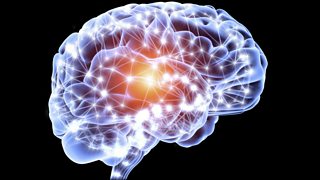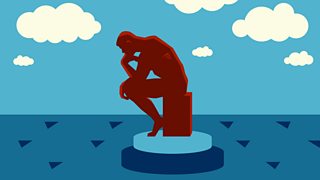Is narcissism on the rise?
At a time when we're being told we need more empathy, some experts claim that narcissism - empathy's evil twin - is on the up. Narcissism has vaulted off the psychotherapist’s couch, sprinted away from the psychiatric ward, and is now squatting in the mainstream of popular conversation. Blogs and books about narcissists are everywhere, and on social media – where the new “selfie generation” resides – “narc-spotting” has become a bit of a sport.
In I feel for you: Narcs and Narcissists Jolyon Jenkins learns how to spot a narcissist, meets a self-confessed celebrity narcissist and learns how to treat narcissism when it tips over the edge into a disorder. He also asks the hotly debated question, is narcissism really on the rise?

What is narcissism?
The Collins English Dictionary describes narcissism as “an exceptional interest in or admiration for oneself, esp one's physical appearance.” It is self-love, and often excessive self-interest in one's own comfort, importance and abilities.
Narcissism is a cluster of personality traits, which we probably all have to some extent. But in its most extreme cases it is a diagnosed mental health condition: Narcissistic Personality Disorder (NPD).
How do you spot a narcissist?
Dr Tennyson Lee is an NHS consultant who specialises in NPD. He explains how there are nine diagnostic criteria for the illness, as laid out in the Diagnostic and Statistical Manual (the American psychiatrist’s bible, used by researchers worldwide). A patient must have five to qualify. The criteria are:

- Grandiose sense of self-importance
- Fantasies of success and power
- Believe self to be special and unique
- Requires excessive admiration
- Entitlement
- Interpersonally exploitative
- Lacks empathy
- Envious of others
- Arrogant and haughty behaviours and attitudes
We probably all know a person who demonstrates some of these traits but “what tips it into a disorder,” says Lee, “is if there’s such a intense manifestation of these traits that it actually causes some sort of suffering or difficulty for the individual or for those around them.”
How common is it really?
One study, which assessed normal people against the Diagnostic and Statistical Manual (DSM) criteria using a questionnaire, said 6% of the American population are narcissists. However, at least five other studies using more stringent criteria couldn’t find a single case, even when using quite large samples. So, depending on the expert, NPD is either pretty common or extremely rare – and some experts don’t think it should be in the DSM at all.

Dr Lee believes the condition is more common than we realise: “I do think it’s a clinical entity which is under diagnosed and under thought of by medical professionals.”
Anoushka Marcin escaped a partner with undiagnosed NPD and now runs a psychology consultancy, advising others on how to spot a narcissist. She agrees: “It is an epidemic. There is a lot of it out there, definitely.”
The self-confessed narcissist who is helping people who live with βhis kindβ
One of Britain’s top narcissists is a man calling himself HG Tudor. He says he knew he was a narcissist from an early age: “I found gratification from manipulating individuals to my own ends and it was after I’d finished at university that my then girlfriend [a psychology graduate] explained to me that she believed that I had Narcissistic Personality Disorder.” He has since been diagnosed with the condition.
“I understand, because of my level of intelligence and awareness, why people think what I do is hurtful but I don’t care about that because it meets my needs,” Tudor says. And the condition is certainly helping him to make a living. He’s written a string of self published books, and for $70 a pop will do online consultations for people who think they may be living with one of “his kind”, advising them on how to “fight back.”
What is the treatment for NPD?
Dr Lee explains how many people with Narcissistic Personality Disorder come to him thinking they have depression, but in fact antidepressant medication will have absolutely no effect on sufferers of NPD.
“The treatment for Narcissistic Personality Disorder is not an easy one,” says Lee. It’s a form of psychotherapy that isn’t plain sailing, not least because it’s difficult to get a patient to admit there is anything wrong with them – they generally think other people are to blame. Many will turn up late to sessions or not at all, because they don’t think the therapy or the person treating them is important.
The good news is that narcissism likely decreases with age. Brent Roberts, Psychology Professor at the University of Illinois, says, “There is relatively profound age trend to narcissism, such that it decreases pretty significantly. In fact if there’s anything I believe is universal it is the fact that older people are less narcissistic than younger people. That has shown repeatedly and convincingly across many different samples.”
Can you help a narcissist?

Bettany Hughes explores narcissism with psychotherapist Philippa Perry.
Is narcissism really on the rise?
Are we dealing with an epidemic of narcissism, or Narcissistic Personality Disorder, or just a moral panic about narcissism?

Jean Twenge, Professor of Psychology at San Diego University, has argued strongly that narcissism is on the rise. She has even written a book about it: “The Narcissism Epidemic.”
Her research seems to show that American college students have become more narcissistic.
There’s a questionnaire that’s been used since the 1980s, called the Narcissistic Personality Inventory. Comparing samples of college students who completed the survey between 1982 and 2009 and those completing it today, it seems there’s been an increase in students using narcissistic terms to describe themselves. “There was a very big increase in the percentage of college students who said they were above average in their drive to achieve,” says Twenge, “There was also a big increase in those who believed they were above average in their leadership ability, also their intellectual confidence and social self-confidence.”
HG Tudor’s business is thriving. Does he think there are more narcissists around? Yes, he says: “I think that the way society has shifted, it’s become more narcissistic and alongside that, it’s cultivating more narcissists.”
But Brent Roberts disagrees. He has taken data sets from three different universities and claims that, if analysed properly, student narcissism actually decreased over thirty years.
It is hard to know whether narcissism is on the rise. Social media is certainly encouraging narcissistic behaviour, and we even have a popularly acknowledged narcissist living in the White House, whose influence is far reaching.
If anything is certain it is that our fascination with narcissism shows no sign of disappearing.
More from Radio 4
-
![]()
I Feel for You: Narcs and narcissists
At a time when we are being told we need more empathy, some experts claim narcissism is on the rise.
-
![]()
16 personality traits and what they mean
Have you ever got muddled over the meaning of masochist, misogynist or misanthrope?
-
![]()
From road rage to social media tirades, it often seems like the planet is in a state of perpetual fury.
-
![]()
How to have a constructive argument
Disagreement can bring many benefits and help us reach better outcomes β itβs just how we go about it.




